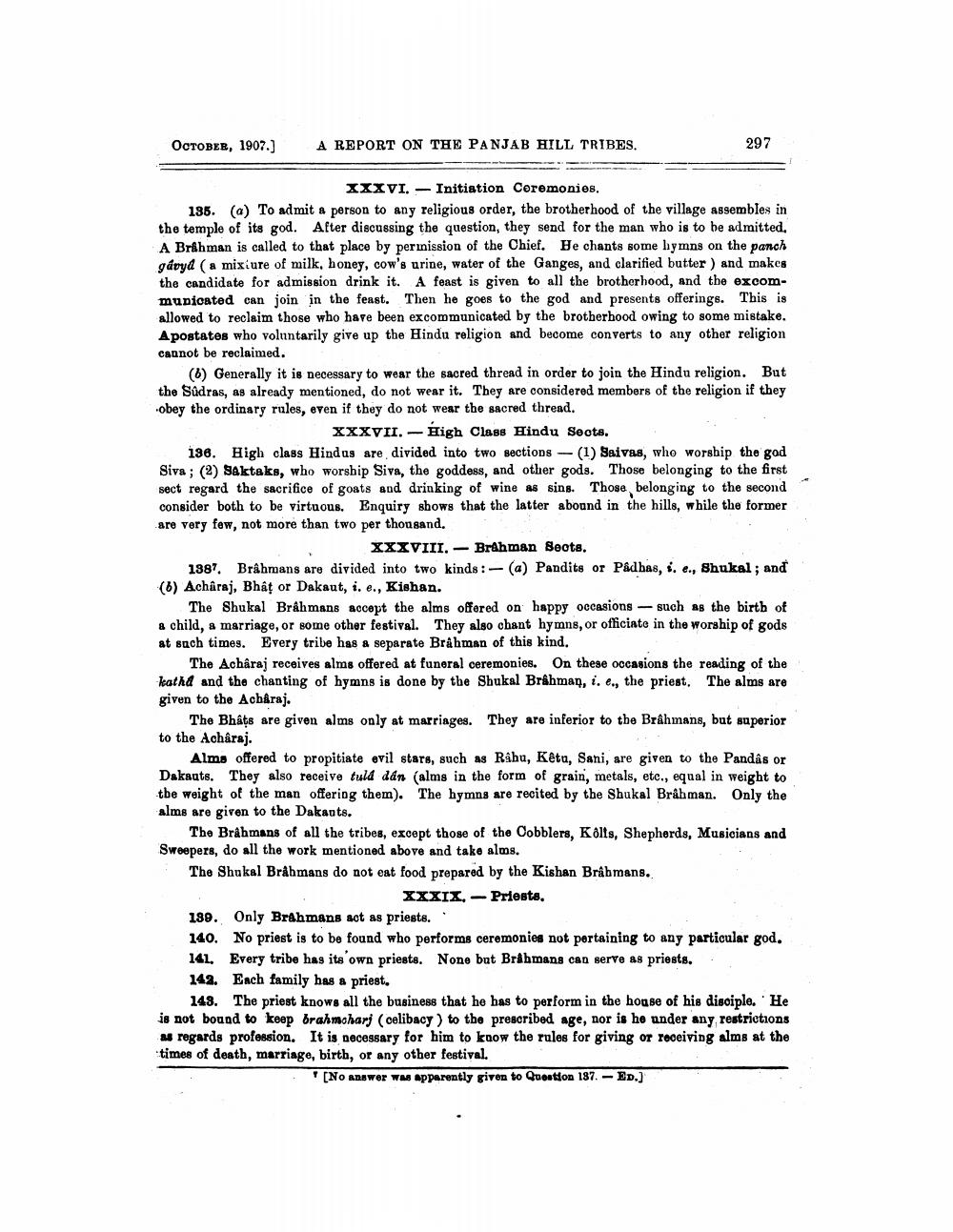________________
OCTOBER, 1907.)
A REPORT ON THE PANJAB HILL TRIBES.
297
XXXVI. - Initiation Coremonies. 135. (a) To admit a person to any religious order, the brotherhood of the village assembles in the temple of its god. After discussing the question, they send for the man who is to be admitted. A Brâhman is called to that place by permission of the Chief. He chants some hymns on the panch gápyd (a mixiure of milk, honey, cow's urine, water of the Ganges, and clarified butter ) and makes the candidate for admission drink it. A feast is given to all the brotherhood, and the excommunicated can join in the feast. Then he goes to the god and presents offerings. This is allowed to reclaim those who have been excommunicated by the brotherhood owing to some mistake. Apostates who voluntarily give up the Hindu religion and become converts to any other religion cannot be reclaimed.
(6) Generally it is necessary to wear the sacred thread in order to join the Hindu religion. But the Sudras, as already mentioned, do not wear it. They are considered members of the religion if they obey the ordinary rules, even if they do not wear the sacred thread.
XXXVII. - High Class Hindu Seots. 138. High class Hindas are divided into two sections -(1) Saivas, who worship the god Siva; (2) Saktaks, who worship Siva, the goddess, and other gods. Those belonging to the first sect regard the sacrifice of goats and drinking of wine as sins. Those belonging to the second consider both to be virtuous. Enquiry shows that the latter abound in the hills, while the former are very few, not more than two per thousand.
XXXVIII. - Brahman Seots. 1887. Brâhmans are divided into two kinds :-(a) Pandits or Pådbas, s. e., Shukal; and (6) Achâraj, Bhâț or Dakaut, i.e., Kishan.
The Shukal Brahmans accept the alms offered on happy occasions - such as the birth of a child, a marriage, or some other festival. They also chant hymns, or officiate in the worship of gods at such times. Every tribe has a separate Brahman of this kind.
The Achâraj receives alms offered at funeral ceremonies. On these occasions the reading of the kathd and the chanting of hymns is done by the Shukal Brahmaq, i, e., the priest. The alms are given to the Achåraj.
The Bhâts are given alms only at marriages. They are inferior to the Brahmans, but superior to the Achâraj.
Alms offered to propitiate evil stars, such as Rahu, Kêtu, Sani, are given to the Pandas or Dakaats. They also receive tuld dán (alms in the form of grain, metals, etc., equal in weight to the weight of the man offering them). The hymns are recited by the Shukal Brahman. Only the alms are given to the Dakauts.
The Brahmans of all the tribes, except those of the Cobblers, Költs, Shepherds, Musicians and Sweepers, do all the work mentioned above and take alms. The Shukal Bråhmans do not eat food prepared by the Kishan Brabmang.
XXXIX. - Prieste, 199. Only Brahmans act as priests. 140. No priest is to be found who performs ceremonies not pertaining to any particular god. 141. Every tribe has its own priests. None bat Brahmans can serve as priests.. 142. Each family has a priest.
148. The priest knows all the business that he has to perform in the house of his disciple. He is not bound to keep brahmoharj (celibacy) to the prescribed age, nor is he under any restrictions 24 regards profession. It is necessary for him to know the rules for giving or receiving alms at the times of death, marriage, birth, or any other festival.
[No answer was apparently given to Question 187. - ED.)




